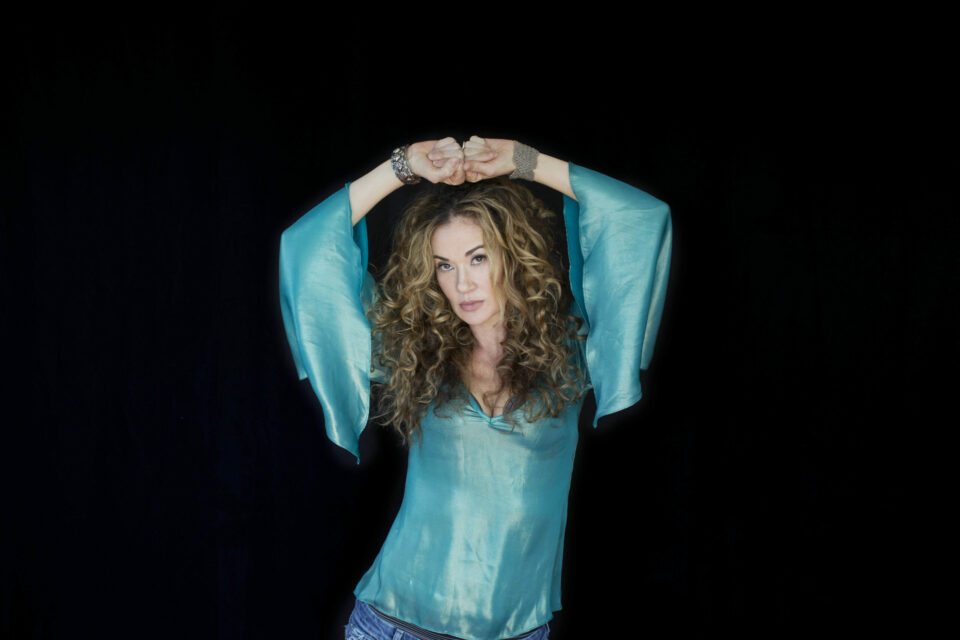Dana Fuchs

Dana Fuchs has never dealt in nostalgia. For this questing artist, it’s not about the rear-view but the road ahead. The next song. The next session. Tonight’s show and tomorrow’s bus ride. But as Dana sheds her musical skin with her triumphant fourth album Love Lives On, it seems a fitting juncture to rewind the reels and thumb a backstory as compelling as any in rock ‘n’ roll. This life and times doesn’t always make for easy reading. The triumphs are laced by tragedy, ugliness, injustice. But whatever the obstacles, music and love have been the beacons that guide her on.
As one of New York City’s favorite daughters, it’s tempting to imagine that Dana’s career began amidst the subterranean throb in the clubs on the Lower East Side. It’s true: that city was her birthplace and springboard to fame. But to truly grasp her artistic motivations, you’d have to follow the family’s car towards Florida, and rattle along the dirt tracks until you hit Wildwood: a backwoods town, population 2000, where black and white were split along battle lines and distrust simmered in the air. “Back in the ’70s, it was a sorta small, racist town,” remembers Dana, who dropped a social hand-grenade by dating a black friend. “We were a big family from New York, Irish-Catholic, there was no one like us in the area. I tended to gravitate more towards the African-American community. I felt more accepted by them.”
Dana and her five older siblings ran wild in the woods (she remembers herself as a “tomboy with dirt under my nails”). Yet this was no picture-perfect childhood, the family’s mood and rhythm set by her father: a former Marine in daily conflict with his demons. “He was a very tortured soul who had one of the most brutal lives of anyone I’ve ever known,” explains Dana of the patriarch commemorated in Faithful Sinner, one of the songs she wrote for the album. “He was tortured by his father and molested by his mother. His beatings only stopped because his father took his own life. My father found him. With all that pain, he was most certainly a flawed parent. He could also be very angry and scary, especially when he drank. Still, we knew he loved us.”
If the household was fractious, then music was always the balm. Ostracised at school, Dana found solace in the stomp-and-holler gospel of her local Baptist church, but it was the British classic rock blasted out by her siblings – The Beatles, Rolling Stones, Led Zeppelin, Queen, Fleetwood Mac – that lit a lightbulb over her head. “That’s when I knew I had to do music,” she explains. “When I started hearing that stuff, at 10 or 11, I stopped listening to other music completely. Later on, I appreciated my parents’ music – Hank Williams, Ray Charles, Billie Holiday – but when I heard the old classic rock ‘n’ roll, I lost my mind over that stuff.”
Dana’s musical appetite was bottomless, and when fronting a band at a local Holiday Inn was no longer enough, the 19-year-old singer hatched a bolder plan. At this time, New York did not hold happy associations. The city had been the backdrop to the tragic death of Dana’s beloved elder sister, Donna. “She and my brother Don had a band, quite popular in the South. She went up to New York City to find her fame and fortune. She took a lot of wrong turns and tragically ended her life.”
Any other 19-year-old might have run a mile from New York’s bearpit music scene, but Dana used the pain as her fuel (“Donna’s suicide,” she says, “catapulted me from despair to determination to fulfil our shared dream of music”). Yet she still needed a foil. One fateful day, pounding the sidewalks of the Lower East Side, Dana heard the missing puzzle-piece, in the form of Jon Diamond: a heavyweight session guitarist who could already boast credits with Joan Osborne and others. “I was walking by this little club and I heard his guitar from the sidewalk,” she recalls of the musical partnership that flourishes to this day. “I introduced myself to Jon on the break, told him I thought he was great, and that I had come to New York to be a singer. So, he invited me up to sing, and I faked Stormy Monday. Afterwards, he said, ‘You have a good instrument, but you really need to learn what you’re doing’.”
After Jon exposed her to his encyclopedic blues vinyl collection, Dana’s astonishing natural vocal prowess took on new depth and nuance. And so they were ready. Together, Jon and Dana hit the Lower East Side’s live circuit like a wrecking ball, holding their own on bills featuring titans like James Cotton and Taj Mahal, and quickly earning a residency at the Red Lion Club. Four nights a week, they shook the foundations until 3am, but there was already the sense they could be far more than a rocking cover band. “Every Tuesday night,” Dana recalls, “we’d play all night, and that’s where we wrote our first handful of tunes and we’d try them out on the crowd.”
Drawn by the pair’s original songs and incendiary performances, those crowds were soon stretching round the block, at mythologized hot-spots like Arlene’s Grocery, The Mercury Lounge and B.B. King’s Blues Club. In the studio, meanwhile, Dana and Jon planted their flag with 2003’s Lonely For A Lifetime: an opening gambit that fizzed with potential, splicing a ’60s Stax/Volt vibe with the driving grit of the Stones, and fusing the dark wit and wisdom of Bob Dylan, Tom Waits and Lucinda Williams. “They’re about addiction and religious hypocrisy,” she noted of tunes like Strung Out and Bible Baby, “and like all the tracks on the album, deal with subjects that I have a deep personal experience with.”
By now, all eyes were on her, and after being spotted by musicians from Broadway’s orchestra pits, Dana won the lead in the hit musical Love, Janis, followed up by the role of Sadie in 2007’s Golden Globe-nominated cult movie, Across The Universe. “We’d been slugging away in New York,” she recalls, “and then I got the show playing Janis Joplin five nights a week. Jon taught me Piece Of My Heart and I went down – and that was it. That led to Across The Universe. The director, Julie Taymor, asked if I could act. So of course, I lied and said, ‘Oh yeah!’”
The demands of stage and screen inevitably impacted on the band’s studio output. But in 2011, the catalogue was thrillingly reignited by Love To Beg, crowned by the UK’s Classic Rock magazine as blues album of the month on the strength of devastating songs like Keep On Rollin’ and Keepsake, which addressed Dana and Jon’s brief (and ill-fated) romantic coupling. “We fought like cats and dogs,” she grins. “The first two weeks we were together, we were breaking up every day.”
Still deeper depths were plumbed on 2013’s “blisteringly good” Bliss Avenue: an album that saw Dana battling back into the light after the death of her brother, and reaching for redemption on cuts like So Hard To Move and Vagabond Wind. “It really purged my soul,” she said, “in a starker, more naked way, lyrically and musically”.
It takes a brave artist to rip it up and start again. But Love Lives On is the best kind of evolution, seeing Dana burst defiant from her darkest days with a sound inspired by the siren call of American soul. “It’s a new beginning for me in every way,” she says. “I’m looking forward to starting chapter two.”
Rest assured, you’ll find all the factors that have helped her conquer the modern music scene, with 13 new songs that offer heart-on-sleeve songwriting, stellar musicianship and the ragged vocal that Classic Rock described as “juke-joint dirty and illicit, evoking Joplin, Jagger and a cigarette bobbing in a glass of bourbon”.
But this time there’s a new creative freedom, borne of Dana completing her existing record contract, contemplating a blank canvas and crowdfunding the record that she was burning to make. “I was at an interesting crossroads,” she remembers. “When my contract was up, I felt a sense of relief that I really held the reins for my next move. I need to be running things. I decided to start my own label called Get Along Records, and to get out of New York and go to the home of the music that inspired me to follow my passion: the Memphis Southern soul of Stax/Volt, Hi Records and Sun Studios. From Otis Redding to Al Green to Johnny Cash. All huge influences.”
For better and worse, the record was also shaped by emotional extremes, as Dana weathered the loss of three beloved family members, before the storm clouds parted with the birth of her son. “Initially, it felt the worst timing to have a baby,” she says, “and I couldn’t have been more wrong. The shift from grief to joy was the most powerful and empowering experience I’ve ever lived. The opportunity arose to take all of the pain from the family loss, the miraculous love of a new baby and put it in a body of music. This album is all about hope and perseverance.”
With her raw emotions at the surface, Dana hit the album sessions in Memphis with purpose. Armed with songs mostly penned with Jon, the singer found an immediate telepathy with producer Kevin Houston (North Mississippi Allstars, Luther Dickinson, The Bo-Keys, Ian Siegal) and a crack-squad studio band that took in original organist Charles Hodges, Stax heavyweight Steve Potts on drums, keys wizard Glenn Patscha, and first-call bassist Jack Daley. “It was so fast and easy,” Dana reflects, “like I’ve never experienced before. Unbelievable mutual respect and admiration between everyone. Not one ego, ever.”
On Love Lives On, the songs are the stars. The album opens in commanding style with Backstreet Baby, driven by grooving guitars, a spring-heeled horn section and a savagely beautiful vocal telling of a woman with “nothing to lose”. Cuts don’t come funkier than Ain’t Nobody’s Fault But Mine, while Callin’ Angels fuses upbeat gospel with a poignant lyric. “It has a verse for each family member,” explains Dana. “It’s become a song of conjuring our loved ones in our hearts at every show.”
Elsewhere, the bittersweet Sittin’ On rides on clipped guitar, Sad Solution offers an effervescent strut, while the vulnerable and reflective title track – written by Dana as she watched her mother slip away in a Florida hospital following an 11-day vigil – traces the circle of life. “This song is about the experience of losing a mother and then becoming one. Letting go of the first love of my life. Lying next to her as she passed, wishing I had asked her so many things. Wishing I had more time.”
Out of darkness comes light. And out of that fascinating early career emerges an older, wiser Dana Fuchs, armed with the album of her life. New label. New studio. New sound. New possibilities for an artist who has so far only hinted at her potential. “I sure hope those who’ve been with me all along will feel as passionately as I do about it,” she concludes. “And that those who have yet to hear me will now come on board. Love Lives On is almost like a second child to me. It’s who I am at this moment in time, captured on tape…”
